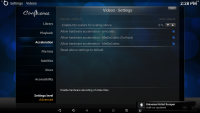Table of Contents
Release Note of Android Marshmallow (v3.0)
Summary
| Release Date | Jun/9/2017 KST |
| Release Type | Regular release |
| Release Files | Self-installation Image (MD5SUM: 4cfa2134b59c43b6758d9b87052b9864) |
File name : selfinstall-odroidc2-eng-s905_6.0.1_master-64-v3.0.img
Official Mirrors by mdrjr
In US
http://www.odroid.in/mirror/dn.odroid.com/S905/Android/ODROID-C2
In Germany
http://de.eu.odroid.in/?directory=.%2Fmirror%2Fdn.odroid.com%2FS905%2FAndroid%2FODROID-C2%2F
New updates
- ODROID-VU5/7/7+/8C LCD backlight brightness control is implemented in settings menu. You need a soldering for the PWM interface.
- Supported HDMI ForceRGB Option.
- Fixed GPS Module ACM device number enumeration problem.
- Add VID and PID of USB GPS device in /system/etc/odroid-usbgps.xml.
Kodi settings
- Kodi 16 is crashing at the end of every video. Uncheck 'Allow hardware acceleration - amcodec' option to solve this issue.
- Kodi 17 has no that issue. It always uses the MediaCodec HW acceleration.
OS installation(flashing)
You can install this OS image into your MicroSD or eMMC with this guide.
A few users reported they couldn't see the Android logo on their TV while installing even though installation is proceeded. So please wait for 5~10 minutes since power on and red and blue LED is on. If blue led is started blinking then installation is proceeding, ODROID-C2 will reboot when finished.
Upgrade Installation
This Marshmallow release doesn't support the update/upgrade from Lollipop.
You must install the self-installation image.
Reference boot.ini
- boot.ini
ODROIDC2-UBOOT-CONFIG setenv dtbaddr 0x1000000 setenv loadaddr 0x20000000 # Resolution Configuration # 'hdmimode' must be one of below to configure display resolution within # supported by your TV or monitor. # Symbol | Resolution # ----------------------+------------- # "480p60hz" | 720x480 Progressive 60Hz # "576p50hz" | 720x576 Progressive 50Hz # "720p60hz" | 1280x720 Progressive 60Hz # "720p50hz" | 1280x720 Progressive 50Hz # "1080p60hz" | 1920x1080 Progressive 60Hz # "1080p50hz" | 1920x1080 Progressive 50Hz # "1080p30hz" | 1920x1080 Progressive 30Hz # "1080p24hz" | 1920x1080 Progressive 24Hz # "1080i60hz" | 1920x1080 Interlaced 60Hz # "1080i50hz" | 1920x1080 Interlaced 50Hz # "2160p60hz" | 3840x2160 Progressive 60Hz # "2160p50hz" | 3840x2160 Progressive 50Hz # "2160p30hz" | 3840x2160 Progressive 30Hz # "2160p25hz" | 3840x2160 Progressive 25Hz # "2160p24hz" | 3840x2160 Progressive 24Hz # "2160p60hz420" | 3840x2160 Progressive 60Hz YCbCr 4:2:0 # "2160p50hz420" | 3840x2160 Progressive 50Hz YCbCr 4:2:0 # "640x480p60hz" | 640x480 Progressive 60Hz # "800x480p60hz" | 800x480 Progressive 60Hz # "800x600p60hz" | 800x600 Progressive 60Hz # "1024x600p60hz" | 1024x600 Progressive 60Hz # "1024x768p60hz" | 1024x768 Progressive 60Hz # "1280x800p60hz" | 1280x800 Progressive 60Hz # "1280x1024p60hz" | 1280x1024 Progressive 60Hz # "1360x768p60hz" | 1360x768 Progressive 60Hz # "1440x900p60hz" | 1440x900 Progressive 60Hz # "1600x900p60hz" | 1600x900 Progressive 60Hz # "1600x1200p60hz" | 1600x1200 Progressive 60Hz # "1680x1050p60hz" | 1680x1050 Progressive 60Hz # "1920x1200p60hz" | 1920x1200 Progressive 60Hz # "2560x1080p60hz" | 2560x1080 Progressive 60Hz # "2560x1440p60hz" | 2560x1440 Progressive 60Hz # "2560x1600p60hz" | 2560x1600 Progressive 60Hz # "3440x1440p60hz" | 3440x1440 Progressive 60Hz setenv hdmimode "1080p60hz" setenv rootopt "root=/dev/mmcblk0p2 rw init=/init rootwait" setenv consoleopt "console=ttyS0,115200" setenv androidopt "androidboot.hardware=odroidc2 androidboot.serialno=${fbt_id#}" setenv logoopt "osd1,loaded,${fb_addr},${hdmimode}" setenv selinuxopt "androidboot.selinux=disabled" # HDMI/DVI Mode Configuration # This will enforce the signal type of display # "hdmi" - For HDMI interface # "dvi" - For DVI interface setenv vout_mode "hdmi" # Display Auto Detection # "false" or "true" setenv display_autodetect "true" # HPD enable/disable option setenv disablehpd "false" # Overscan offset configuration # All offsets are zero and can be tuned by manual or ODROID Utility setenv overscan_top "0" setenv overscan_left "0" setenv overscan_bottom "0" setenv overscan_right "0" setenv led_onoff "on" suspend_hdmiphy=0 # Enable/Disable HDMI CEC Control setenv hdmi_cec "0" # Disabled # setenv hdmi_cec "1" # Enabled # setenv hdmi_cec "2" # Enabled but disable auto TV switching ON # Force HDMI to use RGB colorspace regardless of TV request setenv hdmi_forcergb "0" # Disabled # setenv hdmi_forcergb "1" # Enabled # max cpu frequency in dvfs table / in MHz unit # setenv max_freq "2016" # 2.016GHz # setenv max_freq "1944" # 1.944GHz # setenv max_freq "1920" # 1.920GHz # setenv max_freq "1896" # 1.896GHz # setenv max_freq "1752" # 1.752GHz # setenv max_freq "1680" # 1.680GHz # setenv max_freq "1656" # 1.656GHz # setenv max_freq "1536" # 1.536GHz setenv max_freq "1536" # max cpu-cores # setenv maxcpus "1" # setenv maxcpus "2" # setenv maxcpus "3" setenv maxcpus "4" # disable vu7 setenv disable_vu7 "false" # invert touch screen x,y setenv touch_invert_x "false" setenv touch_invert_y "false" # gpio power key : J2 (2x20) Pin#35, GPIOY.BIT3 #setenv gpiopower "214" # usb timing tweak setenv usbmulticam "false" if test "${hdmi_cec}" = "0"; then setenv hdmitx "hdmitx=cec0"; fi if test "${hdmi_cec}" = "1"; then setenv hdmitx "hdmitx=cecf"; fi if test "${hdmi_cec}" = "2"; then setenv hdmitx "hdmitx=cec7"; fi if test "${hdmi_forcergb}" = "1"; then setenv hdmitx "${hdmitx},forcergb"; fi if test "${display_autodetect}" = "true"; then usb pwren; hdmitx edid; fi if test "${hdmimode}" = "custombuilt"; then setenv cmode "modeline=${modeline}"; fi # Enable backlight_pwm # disable : backlight "no" # ODROID-VU5/7 : backlight "yes" # ODROID-VU8 : backlight "invert" setenv backlight_pwm "no" setenv bootargs "${rootopt} ${consoleopt} hdmimode=${hdmimode} ${cmode} ${hdmitx} vout=${vout_mode} disablehpd=${disablehpd} logo=${logoopt} ${androidopt} ${selinuxopt} suspend_hdmiphy=${suspend_hdmiphy} led_onoff=${led_onoff} max_freq=${max_freq} maxcpus=${maxcpus} disable_vu7=${disable_vu7} touch_invert_x=${touch_invert_x} touch_invert_y=${touch_invert_y} usbmulticam=${usbmulticam} gpiopower=${gpiopower} backlight_pwm=${backlight_pwm}" save showlogo ${hdmimode} #usb pwren movi read dtb 0 ${dtbaddr} # load kernel from vat or boot partition. movi read boot 0 ${loadaddr} #fatload mmc 0:1 ${loadaddr} Image_android booti ${loadaddr} - ${dtbaddr}
